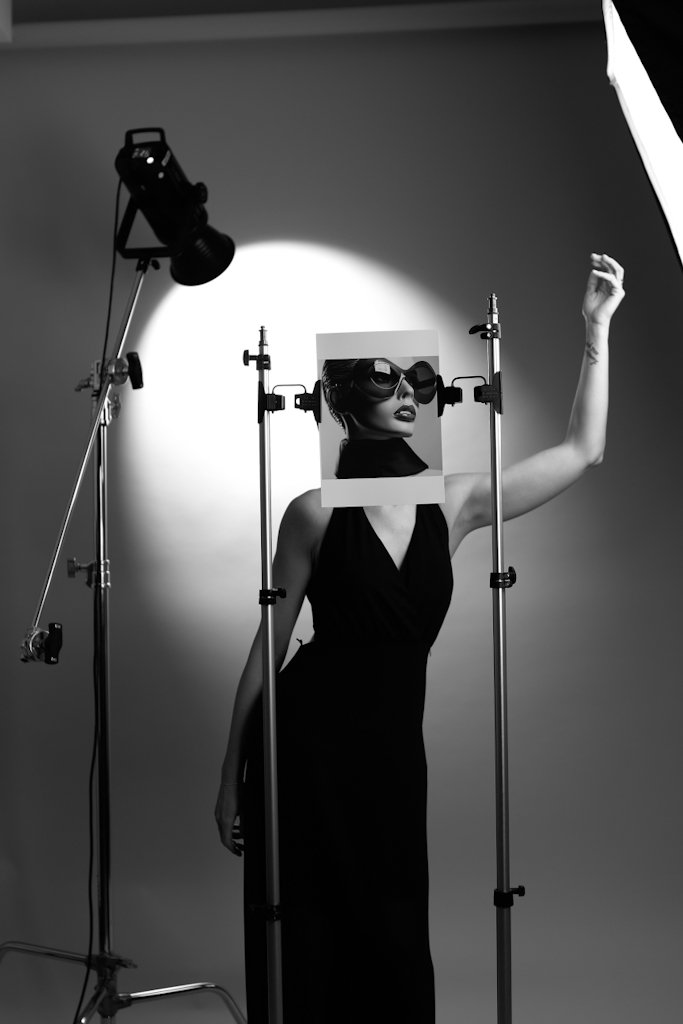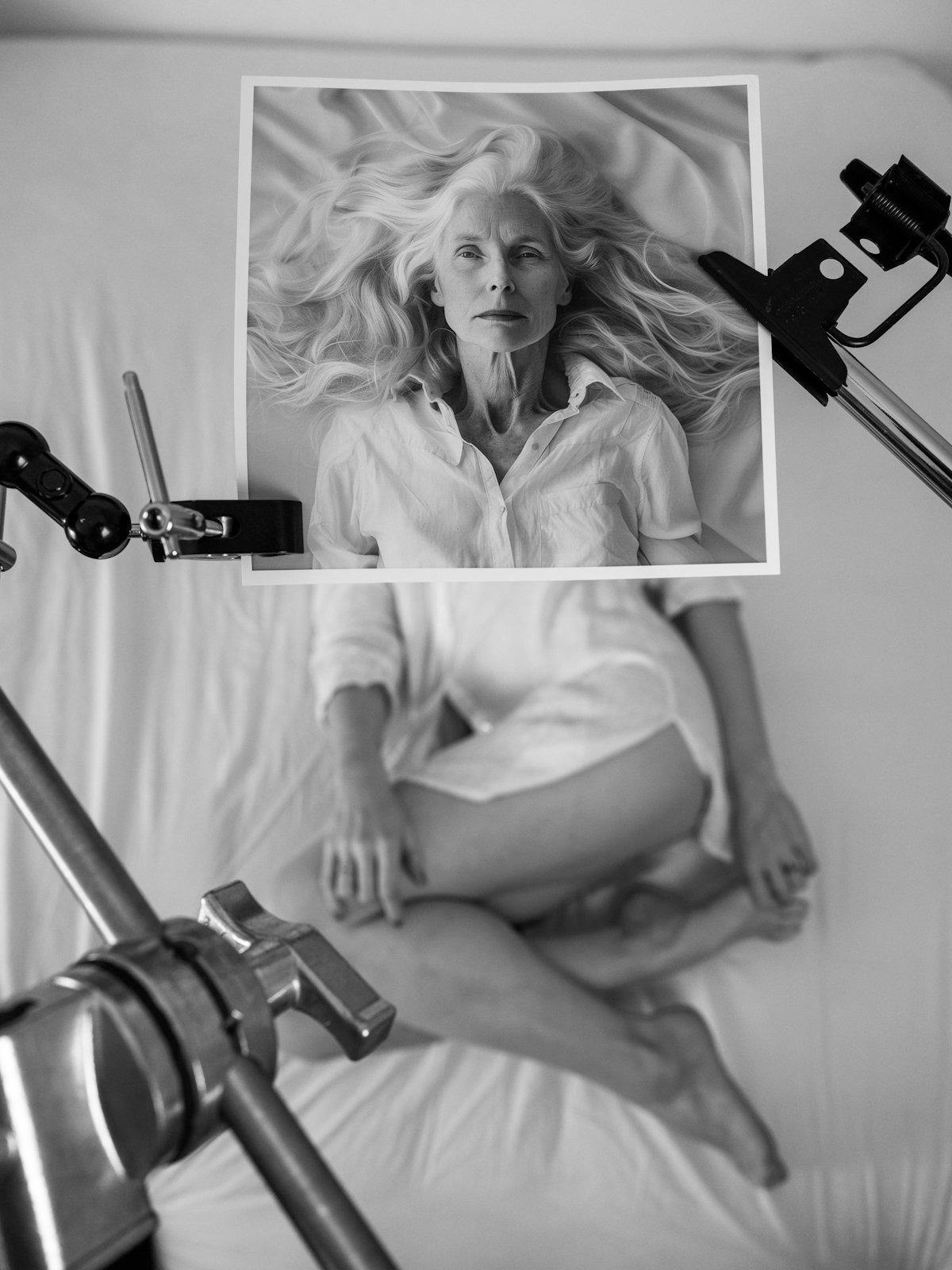
Augmented Unreality
“Photographers use AI tools for different purposes: idea generators, hybrid incubators, and simple editors. Norberto Pezzotta studies and questions the tool itself and how it shapes our beliefs and ideals. Augmented Unreality puts AI, beauty, and humanness under the microscope, highlighting the importance of working outside the tool to maintain our integrity, authenticity, and diversity. In Pezzotta’s laboratory-like settings, an experiment is underway that brings together the ever-sharp AI-generated creations, masking the softer presence of the human form, often dissolving, becoming a distant memory. Who makes up the algorithmic ideals that we prescribe to? This work asks us to step back, see the many possibilities of what we find beautiful, and question why.”
M. Foley
Owner - Foley Gallery NYC
The bartender - 2024
Confortably plus - 2024
The doll - 2023
Me and my thoughts - 2024
Gracefully grown old - 2024
Tie me up - 2024
The poser - 2024
Genderless - 2024
Proudly out of shape - 2024
In love with dance - 2024
After surgery - 2024
The piano student - 2024
Apnea - 2024
Super fit - 2024
Plastic me - 2024
Under treatment - 2024
Fainted - 2024
Il progetto fotografico “Augmented Unreality" esplora il concetto di bellezza e le sue implicazioni nell'era dell'intelligenza artificiale.
Viviamo in un'epoca in cui esibiamo incessantemente la versione idealizzata di noi stessi. Mostriamo tutto ciò che supporta un’immagine “perfetta” di bellezza, spesso basata su desideri e aspettative piuttosto che sulla realtà. Questo comportamento genera una percezione limitata e distorta della bellezza, riducendola a una perfezione superficiale priva di autenticità.
La bellezza autentica è molto più profonda. Non è solo ciò che appare esternamente, ma è influenzata dalle nostre esperienze personali, dai ricordi e dalle influenze culturali. È un riflesso di chi siamo, un insieme unico di geni ed esperienze di vita che non può essere duplicato. La bellezza, dunque, non è un concetto statico, ma dinamico e in costante evoluzione, plasmato dai contesti sociali, storici e individuali.
In un mondo sempre più dominato dall'intelligenza artificiale, la definizione di bellezza rischia di diventare sempre più standardizzata, perdendo così la sua ricchezza e diversità. La tecnologia tende a creare e perpetuare modelli estetici uniformi, basati su algoritmi alimentati da dati spesso limitati e parziali. Questo può portare a un ideale di bellezza superficiale e omogeneo, che non rappresenta la vera diversità dell'esperienza umana.
Nel mio processo creativo, utilizzo l'intelligenza artificiale per generare immagini che rispondano ad un preciso input creativo. Una volta concepite, esse vengono stampate su carta e da me posizionate nello spazio fisico del mio studio per essere catturate, insieme a modelli reali, dall'obiettivo della mia fotocamera.
"Augmented Unreality" non è solo un esercizio artistico, ma anche una riflessione sull'importanza di preservare una visione inclusiva e diversificata della bellezza. In un'epoca in cui la tecnologia ha il potere di ridefinire i nostri standard estetici, è fondamentale che queste nuove definizioni siano inclusive e rappresentative della varietà umana. Solo così possiamo garantire che la bellezza continui a riflettere autenticamente la nostra umanità, in tutta la sua complessità e diversità.
__________________
The photographic project "Augmented Unreality" explores the concept of beauty and its implications in the age of artificial intelligence.
We live in a time where we incessantly display the idealized version of ourselves. We showcase everything that supports a "perfect" image of beauty, often based on desires and expectations rather than reality. This behavior generates a limited and distorted perception of beauty, reducing it to a superficial perfection devoid of authenticity.
Authentic beauty is much deeper. It is not just what appears externally but is influenced by our personal experiences, memories, and cultural influences. It is a reflection of who we are, a unique combination of genes and life experiences that cannot be duplicated. Beauty, therefore, is not a static concept but a dynamic and constantly evolving one, shaped by social, historical, and individual contexts.
In a world increasingly dominated by artificial intelligence, the definition of beauty risks becoming more standardized, thus losing its richness and diversity. Technology tends to create and perpetuate uniform aesthetic models, based on algorithms fed by often limited and partial data. This can lead to an ideal of superficial and homogeneous beauty that does not represent the true diversity of the human experience.
In my creative process, I use artificial intelligence to generate images that respond to a specific creative input. Once conceived, these images are printed on paper and placed by me in the physical space of my studio to be captured, together with real models, by my camera lens.
"Augmented Unreality" is not just an artistic exercise but also a reflection on the importance of preserving an inclusive and diverse vision of beauty. In an era where technology has the power to redefine our aesthetic standards, it is essential that these new definitions are inclusive and representative of human variety. Only in this way can we ensure that beauty continues to authentically reflect our humanity, in all its complexity and diversity.— Fonte citazione
Le origini di Augmented Unreality
Le immagini che compongono "The origins" nascono quasi per caso, come parte di una ricerca creativa sviluppata per un progetto commissionato oltre 15 anni fa. All’epoca, ero mosso dall'esigenza di esplorare nuove tecniche visive e sperimentavo con la sovrapposizione di immagini, spingendo i limiti di ciò che era possibile ottenere con gli strumenti disponibili. Questo processo, tanto impegnativo quanto affascinante, non era pensato per diventare un progetto autonomo, ma piuttosto un esercizio tecnico e creativo.
Solo molti anni dopo, ritrovando quei file dimenticati in un vecchio hard disk, ho iniziato a riconsiderarne il potenziale. Rivedendo quelle immagini, mi sono reso conto di quanto fossero attuali e potenti, non solo come espressioni artistiche ma anche come metafore di temi contemporanei. Così è nata l'idea di sviluppare "Augmented Unreality", un progetto che utilizza questa stessa tecnica per esplorare la relazione tra bellezza, autenticità e l'era dell'intelligenza artificiale.
"The Origins" rappresenta, quindi, il punto di partenza di un viaggio creativo che, a distanza di anni, mi ha permesso di riconsiderare l'importanza di quelle prime sperimentazioni. Questo progetto non è solo la testimonianza di un'esplorazione artistica iniziale, ma anche un richiamo a guardare al passato con occhi nuovi, trovando connessioni inattese con le sfide e le opportunità del presente.
The origins of “Augmented Unreality”
The images that make up "The Origins" came about almost by chance, as part of a creative exploration developed for a commissioned project over 15 years ago. At the time, I was driven by the need to explore new visual techniques and experimented with image layering, pushing the limits of what was possible with the tools available. This process, as demanding as it was fascinating, was not intended to become an independent project but rather a technical and creative exercise.
Only many years later, upon rediscovering those forgotten files on an old hard drive, did I begin to reconsider their potential. Revisiting those images, I realized how current and powerful they were—not only as artistic expressions but also as metaphors for contemporary themes. This realization sparked the idea of developing "Augmented Unreality", a project that employs this same technique to explore the relationship between beauty, authenticity, and the era of artificial intelligence.
"The Origins" thus represents the starting point of a creative journey that, years later, allowed me to reassess the importance of those initial experiments. This project is not only a testament to an early artistic exploration but also an invitation to look back with fresh eyes, discovering unexpected connections to the challenges and opportunities of the present.
Mannequin girl - 2009
A new me - 2009
Drawn me - 2009
Dream legs - 2014






















